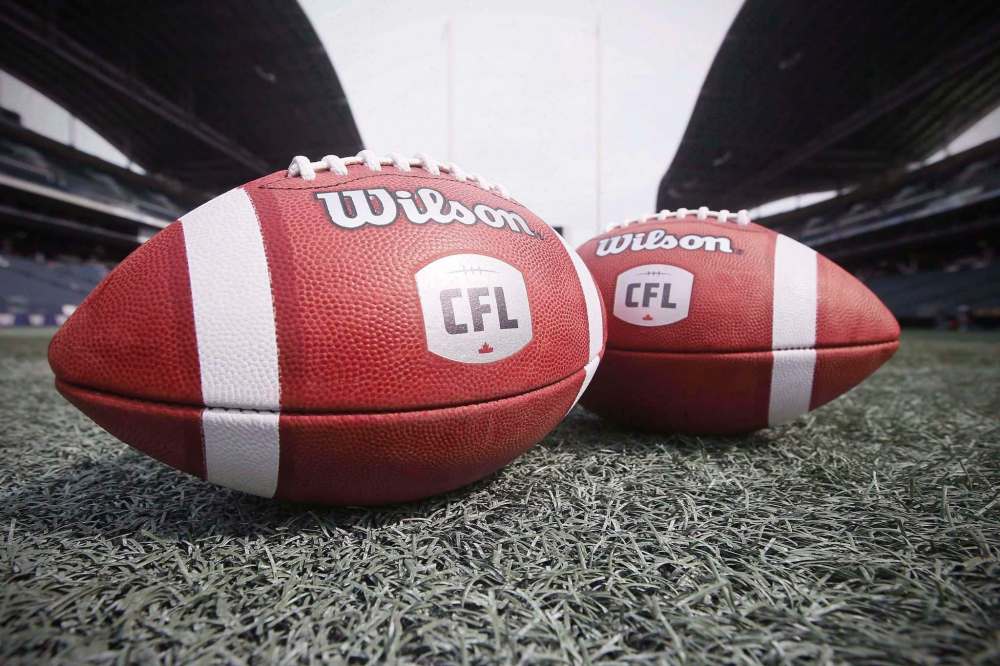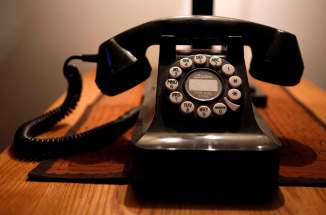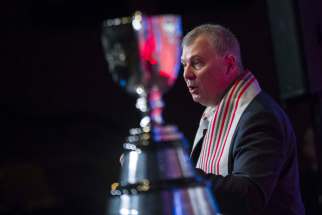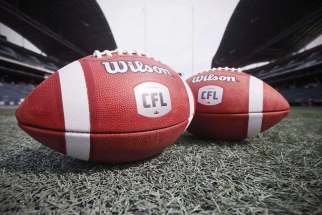CFL hub-city plan a risky trick play
Read this article for free:
or
Already have an account? Log in here »
To continue reading, please subscribe:
Monthly Digital Subscription
$0 for the first 4 weeks*
- Enjoy unlimited reading on winnipegfreepress.com
- Read the E-Edition, our digital replica newspaper
- Access News Break, our award-winning app
- Play interactive puzzles
*No charge for 4 weeks then price increases to the regular rate of $19.00 plus GST every four weeks. Offer available to new and qualified returning subscribers only. Cancel any time.
Monthly Digital Subscription
$4.75/week*
- Enjoy unlimited reading on winnipegfreepress.com
- Read the E-Edition, our digital replica newspaper
- Access News Break, our award-winning app
- Play interactive puzzles
*Billed as $19 plus GST every four weeks. Cancel any time.
To continue reading, please subscribe:
Add Free Press access to your Brandon Sun subscription for only an additional
$1 for the first 4 weeks*
*Your next subscription payment will increase by $1.00 and you will be charged $16.99 plus GST for four weeks. After four weeks, your payment will increase to $23.99 plus GST every four weeks.
Read unlimited articles for free today:
or
Already have an account? Log in here »
Hey there, time traveller!
This article was published 22/07/2020 (1969 days ago), so information in it may no longer be current.
In football parlance, the infraction is sometimes referred to as a “false start.”
It occurs when a player on the offensive team — usually a lineman — prematurely breaks from his rule-mandated “stance” before the ball is snapped, prompting a stripe-shirted sideline official to blow his whistle and throw a penalty flag.
Cost of the illegal-procedure penalty is five yards — the most minor inconvenience imposed on a team for a rules infraction.
With the Canadian Football League having officially declared Winnipeg the hub city for a 2020 season that remains, at best, a highly speculative undertaking, many observers — from sports analysts to opposition politicians to casual but COVID-cautious gridiron fans — have been quick to signal that the CFL, the Winnipeg Blue Bombers and Manitoba’s premier have jumped offside with their promotion of this province as a temporary safe haven for the league’s large and geographically dispersed workforce.
The key question that remains is the cost that might be borne by Manitobans for the infraction. And the worry is that it could be much greater than the public-health equivalent of a five-yard penalty.
This province has, until a recent surge in confirmed COVID-19 cases during the past week, been a best-case blueprint for how a region can manage the global pandemic in a manner that keeps its case numbers low and its population relatively safe and healthy. One of the most important factors in Manitoba’s success has been its ability — partly through diligent policy-making and correlated public acquiescence, and partly as a consequence of simple geographic luck — to isolate itself from the places and people that have been hit much harder by the novel coronavirus’s deadly spread.
But now, as COVID-19 continues to surge unabated across many parts of the United States, the CFL and Manitoba are proposing to import 700 to 800 professional athletes — including many from football (and COVID-19) hot spots such as Florida, Texas, Arizona and California — into Winnipeg for 15 weeks to prepare for and play an abbreviated Canadian football season in a single locale, presumably in front of empty grandstands.
Premier Brian Pallister, a day before the choice of Winnipeg was announced Tuesday, committed $2.5 million of provincial support to the effort to bring the CFL season here, citing the many-times-multiplied economic spinoffs it would create. And after months of preaching extreme caution and disciplined distancing to Manitobans, the premier defended his government’s backing of the CFL pitch by stating that “We can’t continue to live our lives in fear.”

Mr. Pallister might have a point, from both an economic and a psychological perspective, but what Manitobans can and should continue to do is demand diligence and sound decision-making when it comes to matters virus-related. The CFL’s proposed plan for players to self-isolate for 14 days and be tested before travelling to Winnipeg — followed by a period of isolation that includes at least two more tests — has failed to allay the concerns of those who view the scheme as flawed and unnecessarily risky.
Many more questions remain unanswered. And the fact the CFL has yet to forge a return-to-play agreement with its players or receive sought-after federal government support might render the entire hub-city discussion moot long before the first forward pass is sent spinning aloft.
But this much is clear: a spike in coronavirus cases in any way linked to a political decision to bring the CFL season here would be viewed by Manitobans as an exceedingly personal foul.











